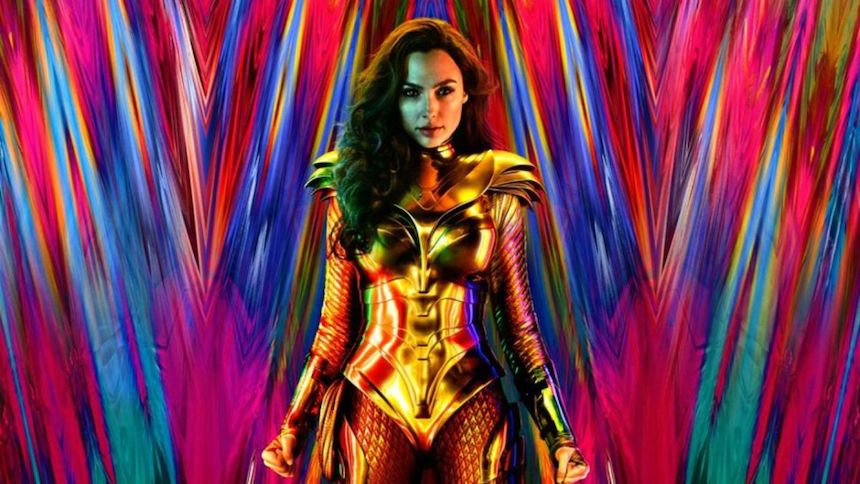Review: WONDER WOMAN 1984, An Underwhelming Sequel
Gal Gadot, Chris Pine, Kristen Wiig & Pedro Pascal star in Patty Jenkins' sequel to her 2017 super-hero hit

Immortality has its perks no doubt (like, for example, not dying), but apparently it also has its drawbacks, like living among short-lived, physically limited mortals, falling irrevocably in love, and then losing said mortal to accident, disease, or old age. A year can feel like a day, a decade like a week, and seventy years like seven months (if that). That, at least, is meant to be the major takeaway from Wonder Woman 1984, the much-anticipated, superhero-centered sequel to the Patty Jenkins-directed Wonder Woman three years ago, with the wonder woman at the center, Diana of Themyscira / Diana Prince (Gal Gadot), inexplicably still pining for her long-dead, mortal lover / World War I pilot-hero / masculine man of action, Steve Trevor (Chris Pine), while still living in material comfort as a glam, high-profile cultural anthropologist at the Smithsonian Museum in Washington, D.C., and fighting street-level crime in a brightly lit shopping mall with dozens of witnesses like a certain wisecracking, alternate universe, comic-book webslinger.
As longtime comic-book readers know by first-hand experience, there's no finality in superhero comics. Dead isn't dead. Superhero characters don't die; they just take extended, off-panel naps, with call-ups back to the comic-book front lines all but inevitable (intellectual property always finds a way). Likewise with the modern contribution to American mythology, the superhero genre where death isn’t final, just provisional (see, e.g., James Buchanan “Bucky” Barnes or the dozens, if not hundreds of superheroes resurrected at the end of Avengers: Endgame), so it shouldn’t come as a surprise that Wonder Woman 1984 not-so-boldly resurrects Steve, plucking him from DC’s non-specific version of the afterlife (i.e., Good Place) via hand-waving magic to temporarily possess the body of an unwilling, thirty-something of the Caucasian persuasion, all because Diana wants nothing more in the world than Steve’s return by any magical means necessary. (Grief therapy would have been less time- or labor-consuming. It also would have made for an entirely different, perhaps better, film.)
Not unexpectedly, Diana’s fervent desire for Steven’s return comes with a terrible price (insert “Monkey Paw” namecheck here), a price that Wonder Woman 1984 takes incredible pains to spell out: The gradual loss of her powers (i.e., becoming mortal), all while another character, Barbara Minerva (Kristen Wiig), an introverted Smithsonian archeologist and more importantly, Diana’s onetime biggest fan — and as we’ve learned from The Incredibles, Iron Man 3, and The Amazing Spider-Man 2 — her biggest enemy once Barbara gets a magical wish of her own (to be like Diana) and discovers, much to no one’s surprise, that power corrupts, etc. Minerva isn’t so much a villain, though, than just another misunderstood character, striking out at a world (specifically the misogynistic men) that’s mistreated, abused, and otherwise ignored her before her incredulous transformation from shy, nerdy archaeologist to alpha predator in an overlong, underlit third act.
Wonder Woman 1984’'s placeholder villain, Maxwell Lord (Pedro Pascal, The Mandalorian), a TV personality and fraudulent businessman with a forgettable catchphrase and an empty bank account, wants that wish thing for himself, mostly because, like practically every comic-book super-villain since time immemorial (roughly 1938), he just wants to rule the world. He also wants to impress his impressionable preteen son, Alistair (Lucian Perez), actually becoming the successful businessman and power player his son believes him to be. Lord’s ambiguously convoluted, head-scratching plan for global domination involves controlling Middle East oil supplies, thus becoming a singular power equal to the United States or the Soviet Union, except, of course, he ends up escalating tensions between Cold War antagonists, possibly ending the world (or something).
Despite the facile, easy comparisons to a certain real-estate developer turned reality-TV host turned political candidate, Lord makes for a bland, unengaging, curiously unenergetic super-villain wannabe, pursuing power for power’s sake, all the while trying to fill a hole in his heart and head (insert multiple yawns here), leaving Diana, a resurrected Steve, discovering the color-filled joys and spandexed pleasures of mid-80s America (a running joke that plays out over the better part of a languid, leisurely hour), and an increasingly antagonistic Minerva to shoulder the too-heavy burden of Wonder Woman 1984’s unwieldy script, a script that’s simultaneously overstuffed and undernourished, long on incident, short on action, and ultimately, dangerously naive, muddled in its approach to the ‘80s Cold War power politics, shortsighted in centering a fictional, comic-book character as Middle East savior, and deliberately refusing to acknowledge, let alone examine, the troubling ethical and moral complications of Steve’s body-possessing return.
Wonder Woman 1984 is now available to screen at movie theaters and via HBO MAX .
Mel Valentin
contributed to this story.







